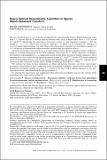Nearly optimal deterministic algorithm for sparse Walsh-Hadamard transform
Author(s)
Cheraghchi, Mahdi; Indyk, Piotr
Downloada34-cheraghchi.pdf (918.4Kb)
OPEN_ACCESS_POLICY
Open Access Policy
Creative Commons Attribution-Noncommercial-Share Alike
Terms of use
Metadata
Show full item recordAbstract
For every fixed constant α > 0, we design an algorithm for computing the k-sparse Walsh-Hadamard transform (i.e., Discrete Fourier Transform over the Boolean cube) of an N-dimensional vector x ∈ R[superscript N] in time k[superscript 1 + α](log N)[superscript O(1)]. Specifically, the algorithm is given query access to x and computes a k-sparse [tilde over x] ∈ R[superscript N] satisfying ‖ [tilde over x]− [caret over x]‖1 ≤ c ‖ [caret over x]− H[subscript k]([caret over x])‖[subscript 1] for an absolute constant c > 0, where [caret over x] is the transform of x and H[subscript k]([caret over x]) is its best k-sparse approximation. Our algorithm is fully deterministic and only uses nonadaptive queries to x (i.e., all queries are determined and performed in parallel when the algorithm starts).
An important technical tool that we use is a construction of nearly optimal and linear lossless condensers, which is a careful instantiation of the GUV condenser (Guruswami et al. [2009]). Moreover, we design a deterministic and nonadaptive ℓ[subscript 1]/ℓ[subscript 1] compressed sensing scheme based on general lossless condensers that is equipped with a fast reconstruction algorithm running in time k[superscript 1 + α](log N)[superscript O(1)] (for the GUV-based condenser) and is of independent interest. Our scheme significantly simplifies and improves an earlier expander-based construction due to Berinde, Gilbert, Indyk, Karloff, and Strauss [Berinde et al. 2008].
Our methods use linear lossless condensers in a black box fashion; therefore, any future improvement on explicit constructions of such condensers would immediately translate to improved parameters in our framework (potentially leading to k(log N)[superscript O(1)] reconstruction time with a reduced exponent in the poly-logarithmic factor, and eliminating the extra parameter α).
By allowing the algorithm to use randomness while still using nonadaptive queries, the runtime of the algorithm can be improved to õ(k log[superscript 3] N).
Date issued
2017-08Department
Massachusetts Institute of Technology. Computer Science and Artificial Intelligence Laboratory; Massachusetts Institute of Technology. Department of Electrical Engineering and Computer ScienceJournal
ACM Transactions on Algorithms (TALG)
Publisher
Association for Computing Machinery
Citation
Cheraghchi, Mahdi and Piotr Indyk. "Nearly Optimal Deterministic Algorithm for Sparse Walsh-Hadamard Transform." ACM Transactions on Algorithms (TALG), 13.3, (August 2017).
Version: Original manuscript
ISBN
978-1-611974-33-1